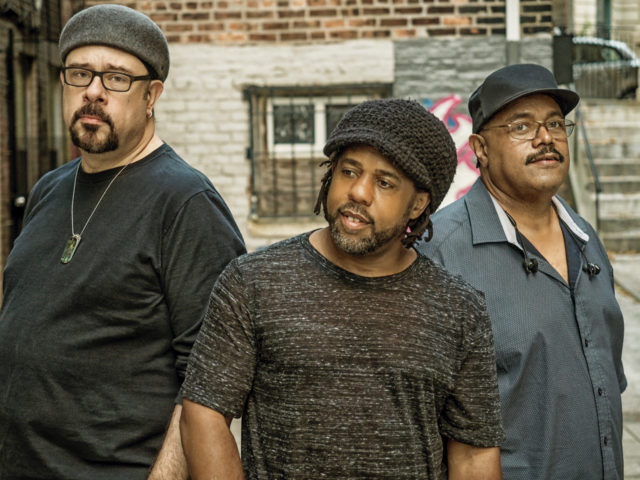
By all accounts, Victor Wooten is a great musician. He’s won five Grammy’s, been named one of the top 10 bassists of all time by Rolling Stone and is the only person to be named “Bassist of the Year” more than once by Bass Player magazine. His biography is full of such accolades, building a strong case for an appraisal of greatness.
But according to Wooten there is no such thing as great nor is there such thing as right because there is no such thing as wrong, whether it be an errant key or a misplaced note. In Wooten’s version of the world, right or wrong needn’t apply because it’s all part of finding “the groove.”
For those familiar with Wooten’s work, whether as founding bassist of Béla Fleck and the Flecktones, solo or with trios, the groove is a familiar sensation. It’s a feeling that’s as obvious in his early work as it is on his latest album with the Victor Wooten Trio, TRYPNOTYX, an electric infused jazz-funk album and his first in five years.
Whether you’re a musician or a listener, you know the groove by feeling it, and Wooten’s greatness comes from his ability to find it, pulling it like a bunny out of a hat. But, where a magician hides his trick with spectacles, Wooten shares his would-be secrets with the world because, he says, there’s nothing secret or special about great music.
For Wooten his greatness (or as he calls it his “spidey-sense”) comes from a methodology instilled in him by his parents, one of working with what you’ve got, believing your success already exists and asking question after question, not in search of an answer but in curiosity of elusive universal truths.
Wooten grew up one of five boys in his family, living in poverty just off the military bases that employed his father. He became a bass player because he had to; his literal band of brothers needed one and he fit the bill. From the first day he picked up his instrument he thought of himself as a capable musician, the words of his mother running through his head: “You are already successful, the rest of the world just doesn’t know it yet.”
“Our parents were more concerned with who we were as people than with what we made of ourselves,” Wooten says. “They wanted to develop five good, generous and honest boys, and if they did that they knew that whatever else we did would be just fine.”
That’s because for his parents, creativity was but a necessary part of what had to be done. His father fought in the Korean War, “you know, back in the time when they still fought hand-to-hand,” enduring unfathomable violence only to return home to a country that wasn’t just unsupportive of the war, but that was being torn apart by the racial politics running much deeper than the color of his skin. His sense of pride never wavered.
Meanwhile, his mother was at home, taking care of the household, her primary role. Amid poverty, her creativity came in turning a bare refrigerator into dinner for 15, in making a mason jar of water enough to quench a family’s thirst and always as a casual philosopher who framed her family’s upbringing in lots of deep conversation and big questions.
“In making do with the lot they had been given, my parents had to be creative and productive, always,” Wooten says. “I never knew we were poor growing up, but like my mom said, ‘God always came through.’”
Whatever the form of Wooten’s own faith, it is just as veritable as his mother’s. But rather than God or church, he points to a broader spirituality as his guide. Wooten doesn’t subscribe to tenets, but to a way of asking questions, naturally guiding his art away from hard-nosed rights and wrongs and toward a journey of inquisition as the final destination.
It was inevitable that he would become a music educator. For the better part of his career he’s been teaching, and since 2000 he’s been hosting music camps out of his school, with sessions named things like “How to Play Well with Others” or “Jamming.” It’s not a traditional approach to education but, in helping students find the groove, it fills a big and important void in traditional music theory.
When asked how many students he’s taught over the years, Wooten just laughs — i.e. there’s been too many to count, especially if you include the thousands who have read his 2006 music education book, The Music Lesson: A Spiritual Search for Growth Through Music.
The book is written as a novel à la Carlos Castaneda, a story written as a conversation between Wooten and several imaginary characters that serve to bring his internal dialectic to life through external dialogue. In effect, it breaks down the barrier between Wooten and his audience and lets them in on the secret to his greatness.
“Mistakes,” he writes, “are just things we didn’t mean to play. It doesn’t mean they are wrong. Some of the best music I ever played started out as a mistake. Mistakes usually throw us off because the note comes out before we think about it. We can’t avoid making mistakes, but we can get comfortable with them, especially if we practice making them.”
On the Bill: The Victor Wooten Trio. Doors: 7:30 p.m. The Caribou Room, 55 Indian Peaks Drive, Nederland. thecaribouroom.com














